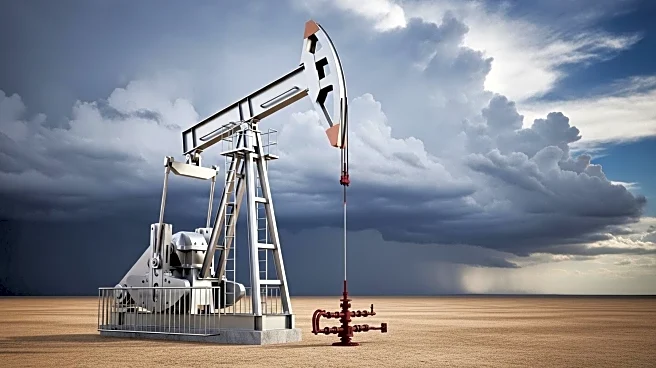What is the story about?
What's Happening?
Oil and gas executives are expressing significant concerns over the current state of the industry, as revealed by the latest Dallas Fed Energy Survey. The survey, which included responses from 139 firms across Texas, northern Louisiana, and southern New Mexico, indicates a decline in oil and gas activity for the third quarter of 2025. This downturn is attributed to rising costs, policy uncertainty, and the impact of new tariffs. The business activity index, a key measure of industry conditions, showed a contraction for the second consecutive quarter. Executives have voiced their frustrations, highlighting that tariffs on steel and aluminum have increased operational costs, making wells uneconomic. Additionally, the uncertainty surrounding the administration's policies has deterred investment, with capital expenditures falling sharply.
Why It's Important?
The current challenges facing the oil and gas sector have broader implications for the U.S. economy and energy policy. The increased costs and policy uncertainty are discouraging investment, which could lead to reduced domestic production and job losses in the industry. The tariffs, particularly on essential materials like steel, are exacerbating these issues by raising production costs. This situation could hinder the U.S.'s ability to maintain energy independence and compete globally. Furthermore, the consolidation of the industry, driven by a lack of capital availability, is leading to job losses and a decline in the innovative culture that once characterized the U.S. shale industry. The ongoing policy volatility may also deter future investments, affecting long-term energy strategies.
What's Next?
The oil and gas industry may continue to face challenges unless there is a shift in policy to address the concerns raised by executives. Potential reactions from industry stakeholders could include lobbying for policy changes or seeking alternative strategies to mitigate the impact of tariffs and uncertainty. The industry might also see further consolidation as smaller firms struggle to survive in the current environment. Additionally, there could be increased pressure on the administration to reconsider its approach to tariffs and energy policy to stabilize the industry and encourage investment.
Beyond the Headlines
The current situation in the oil and gas sector highlights the complex interplay between government policy and industry dynamics. The tariffs and policy uncertainty not only affect immediate business operations but also have long-term implications for the U.S.'s energy landscape. The potential shift away from smaller, independent operators to larger, consolidated entities could alter the competitive landscape and innovation within the industry. Moreover, the political dimension of energy policy, with its potential for rapid changes, underscores the need for a more stable and predictable regulatory environment to foster sustainable growth.
















